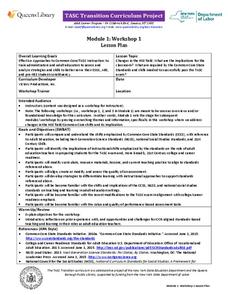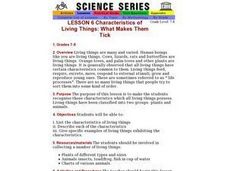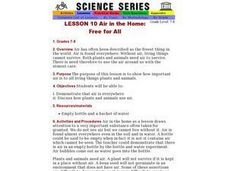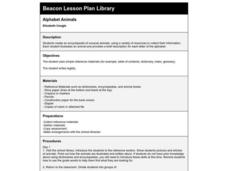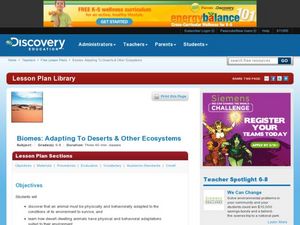Curated OER
Hearing The Warning Bells
Explore hearing loss and ways in which technology can help the hearing impaired by experiencing a simulation of hearing impairment and by researching in order to present related topics. Learners will also investigate and evaluate dangers...
Curated OER
Science: Discovering Sharks
Pupils incorporate some basic information regarding ocean life and ecological conservation into their "earth watch" lives.
Curated OER
What Are The Properties of Sea Water?
Ninth graders conduct research on the subject of sea water. They use a variety of resources to obtain information. There are helpful resource links listed in the lesson plan. In conjunction with the research students make inquiry of the...
Cornell University
Catapults
Ready, aim, fire! Launch to a new level of understanding as scholars build and test their own catapults. Learners explore lever design and how adjusting the fulcrum changes the outcome.
Curated OER
Arizona Plant Booklet: An Introduction to Arizona Plants & Cacti
Students explore variety of plants & cacti in their Arizona community by collecting samples and taking photographs. Can be adapted to other areas.
Cornell University
Nano Interactions
Tiny particles can provide big learning opportunities! Middle school scientists explore the world of nanoparticles through reading, discussion, and experiment. Collaborative groups first apply nanotechnology to determine water hardness....
New York State Education Department
TASC Transition Curriculum: Workshop 1
Work out your core, Common Core State Standards, through the first workshop in a series of 15 designed for educators. Inquiry-based activities designed for all content areas and grade levels explore the shifts to new standards,...
California Academy of Science
Nuclear Energy: What's Your Reaction?
OSHA confirms that rules governing worker safety at nuclear power plants ranks higher than worker safety in offices. Scholars must consider safety, cost, alternatives, and other factors before recommending whether a town should build a...
Curated OER
Magnetism: Magnet, Magnet, Where are you?
Students study the characteristics of magnets including polarity, and the concepts of attraction and repulsion. They examine how magnets are used industry.
Curated OER
Characteristics of Living Things: What Makes Them Tick
Students list the characteristics of living things and give specific examples of living things exhibiting these characteristics. They bring in examples of living things.
Curated OER
Air in the Home: Free for All
Students explain that air is everywhere and discuss how living things use air.
Curated OER
Solving Science Mysteries
Students choose a science-related mystery to investigate such as the Loch Ness Monster or Bigfoot. They, in groups, research theories and give a persuasive talk presenting the theory they feel to be most likely.
Curated OER
Alphabet Animals
Second graders create an encyclopedia of unusual animals, using a variety of resources to collect their information. Each student illustrates an animal and provides a brief description for each letter of the alphabet. A very nice,...
Curated OER
Biomes: Adapting To Deserts & Other Ecosystems
Middle schoolers examine how animals must be adapted to the conditions of its environment to survive. In this biomes lesson students research desert adaptations then discuss how these animals have survived.
Curated OER
Prairies
students make booklets about each of the following: reptiles, birds, plants, animals and buffalo. Each was information and contained the facts covered in class. they research one specific area in which they were especially interested....
Curated OER
Ecosystems
Students work in small groups to create a poster illustrating the flow of energy through a typical ecosystem, then present their posters to the class.
Curated OER
Now Hear This!
Students observe the differences between low- and high-frequency sounds. They research and compare the characteristics of various animals that rely on infrasonic sounds to communicate.
Curated OER
Discovering New Species
Students identify animals observed by Lewis and Clark while evaluating the animal's habitat and describing the animal's behavior. Students construct a food web mobile to illustrate the animal's position in the food web in the 19th...
Curated OER
Replicating Controversy
Student act as a research scientists and investigate the development of animal and human cloning. They then report their findings, both orally and visually, to their "colleagues" at a symposium on cloning research. Learners explore the...
Curated OER
Citizens For the New Zoo
Third graders complete Internet research to find information about an animal and its basic needs. They design a model of a zoo habitat that would accommodate their animal. They write a letter of recommendation to a Zoo board of directors...
Curated OER
Waltz Across Texas
Seventh graders conduct research about regions of Texas by using the web. They research an endangered plant AND an endangered animal that is found in their region. Students prepare and deliver oral reports about their region.
Curated OER
Pio, Pio, Que Frio
Students investigate the characteristics of living things. They determine that different organisms have different needs and describe and compare them. They draw and verbally respond about their favorite animal.
Curated OER
Origins
Students trace the history of the invention of everyday objects. They brainstorm a list of curios objects and watch a video clip showing an example of tracing the origins of squeezable ketchup. In small groups, they choose an item to...
Curated OER
The Wetlands
Complete a comparison of the wetlands found in New York and Louisiana. Using various research methods, gather data on the wetlands found in New York and Louisiana, the animals, conditions, etc. Data is used to create a brief report on...








